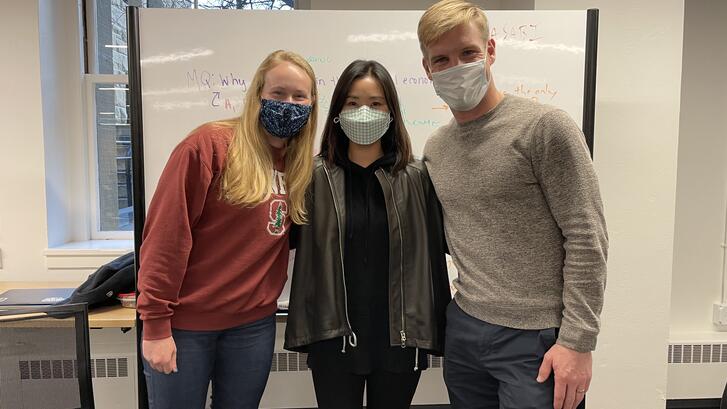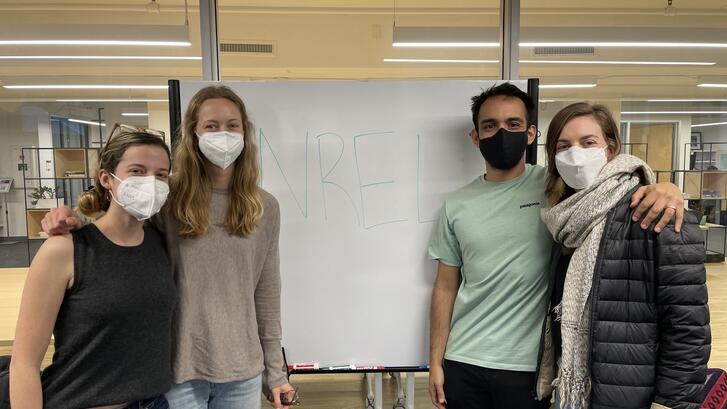Where Our Master's Students are Making Policy Impacts in 2022
Where Our Master's Students are Making Policy Impacts in 2022
From women's health and reproductive rights in India to cybersecurity issues in Washington D.C., students from the 2022 cohort of the Ford Dorsey Master's in International Policy are tackling big policy projects in the Policy Change Studio.

Theory and classroom learning are critical, but in the world of policymaking, nothing is as instructive as hands-on practice in problem-solving.
To better facilitate this kind of learning, our second-year Ford Dorsey Master’s in International Policy (MIP) students participate in the Policy Change Studio, a pioneering program at the Freeman Spogli Institute for International Studies which pairs students with organizations across the globe to work on policy challenges in real-time.
As the first quarter of their capstone assignments gets underway, students from our 2022 MIP cohort share what they’re working on and how they hope to contribute to their partner organizations in the coming months.
The Informal Economy and Economic Inclusion in Tunisia

Currently, the informal sector makes up about 40% of Tunisia’s GDP, which limits the country’s overall economic growth due to limitations such as lost tax revenue, stymied workers’ productivity, and disincentives to foreign direct investment.
Moving forward, our team is prioritizing collaborative outreach and learning from others, as well as iterative problem-solving and dynamic policy solutions. We hope our approach is able to contribute to positive change and continued learning both for us and for the stakeholders we are working to support.
Spatial Inequalities in South Africa
![Janani Mohan, Eli MacKinnon and Leonel Diaz [pictured on phone]](https://fsi9-prod.s3.us-west-1.amazonaws.com/s3fs-public/styles/727x409/public/block-text-media/mip_policy_studio_south_africa.jpg?h=71976bb4&itok=6RNz1lC8)
South Africa is one of the most unequal countries in the world, with a highly skewed income distribution and vast disparities in employment access across different regions and social groups. If measured with the Gini coefficient, it is the most unequal country in the world. This inequality has been stubbornly resistant to decades of post-apartheid policy intervention and is a vital issue threatening the country’s prosperity.
We are humbled and extremely excited to delve into this problem with our partners at UNDP. We think that approaching it with humility, an open mind, and a willingness to engage with the people directly affected by inequality — especially young South Africans experiencing high unemployment — will be key to uncovering meaningful ways to address this challenge.
Market and Policy Barriers to Emissions Reduction in Indonesia

These processes account for 29% of global energy demand and around 15% of global greenhouse gas emissions, and overwhelmingly rely on fossil fuels and are a significant contributor to climate change. Challenges to switching fuel sources range from affordability to technological obstacles around generating high temperatures.
Since trends in development and population growth place Indonesia as a key player in the fight against climate change, we are looking forward to helping NREL identify barriers and solutions to the coutnry's current industrial heat situation while also exploring clean energy opportunities.
Ransomware Attacks and Government Legislation in Washington D.C.

Currently, the team we are partnered with is working with stakeholders in government, industry and academia to understand the effects that various regulatory and legislative tools have on prohibiting ransomware payments and on the frequency of such attacks. Based on this research, we will help identify key actions the government can take to further combat cyberattcks.
Lack of Information about Reproductive Rights and Sexual Health in India

We are currently reaching out to a range of academic experts and practitioners working in the field in order to fully understand the extent of the problem as well as its causes. Ultimately, we seek to identify interventions that can help empower women in India to make informed choices about matters of health, fertility and other decisions related to their bodily autonomy and integrity.
Russian Hybrid Attacks and Military Provocations in Estonia
![Johannes Hui, Dave Sprague, Bradley Jackson and Arelena Shala [not pictured]](https://fsi9-prod.s3.us-west-1.amazonaws.com/s3fs-public/styles/727x409/public/block-text-media/mip_policy_studio_estonia_2_0.jpg?h=71976bb4&itok=s4Y72XRf)
Russian aggression in the Baltic region in the form of hybrid acts has continued unabated because meaningful costs sufficient to prompt changes in this destabalizing behavior have yet to be imposed on Russia. In the meantime, vulnerable, less powerful regional states in Estonia, Latvia and Lithuania continue to bear the costs.
We are seeking to better understand the depth of Russian provocations in the region, what practices already exist to counter them, and what emergent threats may be developing. Our research in these areas will be used to provide policy recommendations to ICDS and its partnered Baltic states.
The Ford Dorsey Master's in International Policy
Want to learn more? MIP holds admission events throughout the year, including graduate fairs and webinars, where you can meet our staff and ask questions about the program.



